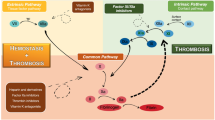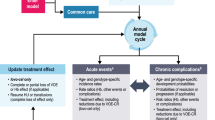Abstract
Inhibitor development is the most serious complication in patients with hemophilia. We investigated association of HLA genotypes with inhibitor development in Korean patients with severe hemophilia A (HA). HLA genotyping was done in 100 patients with severe HA including 27 patients with inhibitors. The allele frequencies between inhibitor-positive and inhibitor-negative patients were compared. HLA class I alleles were not associated with the inhibitor status. In HLA class II, DRB1*15 [n = 100, odds ratio (OR) 0.217, P = 0.028] and DPB1*05:01 [OR 0.461, P = 0.026] were negatively associated with inhibitor development. In a subgroup of patients with intron 22 inversion, C*07:02 was positively associated with inhibitor development [n = 30, OR 5.500, P = 0.043]. In the subgroup of patients without intron 22 inversion, the negative association between DPB1*05:01 and inhibitor development was reinforced [n = 70, OR 0.327, P = 0.010], and positive association of DRB1*13:02 and DPB1*04:01 with inhibitor development was identified [OR 3.059, P = 0.037 for both]. Previously reported risk alleles were not consistently associated with inhibitor risk in our series. This study demonstrated the profile of HLA alleles associated with inhibitor risk in Korean patients with severe HA was different from that in patients of other ethnicities, which needs to be considered in risk assessment and management.
Similar content being viewed by others
References
Klinge J, Ananyeva NM, Hauser CA, Saenko EL (2002) Hemophilia A—from basic science to clinical practice. Semin Thromb Hemost 28:309–322. https://doi.org/10.1055/s-2002-32667
Ryu JE, Park YS, Yoo KY, Lee KD, Choi YM (2015) Immune tolerance induction in patients with severe hemophilia A with inhibitors. Blood Res 50:248–253. https://doi.org/10.5045/br.2015.50.4.248
Chalmers EA, Brown SA, Keeling D, Liesner R, Richards M, Stirling D, Thomas A, Vidler V, Williams MD, Young D (2007) Early factor VIII exposure and subsequent inhibitor development in children with severe haemophilia A. Haemophilia 13:149–155. https://doi.org/10.1111/j.1365-2516.2006.01418.x
Astermark J, Oldenburg J, Escobar M, White GC 2nd, Berntorp E (2005) The Malmo International Brother Study (MIBS). Genetic defects and inhibitor development in siblings with severe hemophilia A. Haematologica 90:924–931
Gouw SC, van den Berg HM, Oldenburg J, Astermark J, de Groot PG, Margaglione M, Thompson AR, van Heerde W, Boekhorst J, Miller CH, le Cessie S, van der Bom JG (2012) F8 gene mutation type and inhibitor development in patients with severe hemophilia A: systematic review and meta-analysis. Blood 119:2922–2934. https://doi.org/10.1182/blood-2011-09-379453
Pandey GS, Yanover C, Miller-Jenkins LM, Garfield S, Cole SA, Curran JE, Moses EK, Rydz N, Simhadri V, Kimchi-Sarfaty C, Lillicrap D, Viel KR, Przytycka TM, Pierce GF, Howard TE, Sauna ZE, Investigators PS (2013) Endogenous factor VIII synthesis from the intron 22-inverted F8 locus may modulate the immunogenicity of replacement therapy for hemophilia A. Nat Med 19:1318–1324. https://doi.org/10.1038/nm.3270
Gouw SC, van den Berg HM (2009) The multifactorial etiology of inhibitor development in hemophilia: genetics and environment. Semin Thromb Hemost 35:723–734. https://doi.org/10.1055/s-0029-1245105
Hay CR, Ollier W, Pepper L, Cumming A, Keeney S, Goodeve AC, Colvin BT, Hill FG, Preston FE, Peake IR (1997) HLA class II profile: a weak determinant of factor VIII inhibitor development in severe haemophilia A. UKHCDO Inhibitor Working Party. Thromb Haemost 77:234–237
Oldenburg J, Picard JK, Schwaab R, Brackmann HH, Tuddenham EG, Simpson E (1997) HLA genotype of patients with severe haemophilia A due to intron 22 inversion with and without inhibitors of factor VIII. Thromb Haemost 77:238–242
Pavlova A, Delev D, Lacroix-Desmazes S, Schwaab R, Mende M, Fimmers R, Astermark J, Oldenburg J (2009) Impact of polymorphisms of the major histocompatibility complex class II, interleukin-10, tumor necrosis factor-alpha and cytotoxic T-lymphocyte antigen-4 genes on inhibitor development in severe hemophilia A. J Thromb Haemost 7:2006–2015. https://doi.org/10.1111/j.1538-7836.2009.03636.x
Ragni MV, Ojeifo O, Feng J, Yan J, Hill KA, Sommer SS, Trucco MN, Brambilla DJ (2009) Risk factors for inhibitor formation in haemophilia: a prevalent case-control study. Haemophilia 15:1074–1082. https://doi.org/10.1111/j.1365-2516.2009.02058.x
Astermark J, Oldenburg J, Carlson J, Pavlova A, Kavakli K, Berntorp E, Lefvert AK (2006) Polymorphisms in the TNFA gene and the risk of inhibitor development in patients with hemophilia A. Blood 108:3739–3745. https://doi.org/10.1182/blood-2006-05-024711
Kim HJ, Chung HS, Kim SK, Yoo KY, Jung SY, Park IA, Lee KO, Kim SH, Kim HJ (2012) Mutation spectrum and inhibitor risk in 100 Korean patients with severe haemophilia A. Haemophilia 18:1008–1013. https://doi.org/10.1111/j.1365-2516.2012.02895.x
Verbruggen B, Novakova I, Wessels H, Boezeman J, van den Berg M, Mauser-Bunschoten E (1995) The Nijmegen modification of the Bethesda assay for factor VIII:C inhibitors: improved specificity and reliability. Thromb Haemost 73:247–251
Liu Q, Sommer SS (1998) Subcycling-PCR for multiplex long-distance amplification of regions with high and low GC content: application to the inversion hotspot in the factor VIII gene. BioTechniques 25:1022–1028
Bagnall RD, Waseem N, Green PM, Giannelli F (2002) Recurrent inversion breaking intron 1 of the factor VIII gene is a frequent cause of severe hemophilia A. Blood 99:168–174
Ohta H, Takahashi I, Kojima T, Takamatsu J, Shima M, Yoshioka A, Saito H, Kamiya T (1999) Histocompatibility antigens and alleles in Japanese haemophilia A patients with or without factor VIII antibodies. Tissue Antigens 54:91–97
Wieland I, Wermes C, Eifrig B, Holstein K, Pollmann H, Siegmund B, Bidlingmaier C, Kurnik K, Nimtz-Talaska A, Niekrens C, Eisert R, Tiede A, Ebenebe C, Lakomek M, Hoy L, Welte K, Sykora KW (2008) Inhibitor-Immunology-Study. Different HLA-types seem to be involved in the inhibitor development in haemophilia A. Hamostaseologie 28(Suppl 1):S26–S28
De Barros MF, Herrero JC, Sell AM, De Melo FC, Braga MA, Pelissari CB, Machado J, De Souza Schiller S, De Souza Hirle L, Visentainer JE (2012) Influence of class I and II HLA alleles on inhibitor development in severe haemophilia A patients from the south of Brazil. Haemophilia 18:e236–e240. https://doi.org/10.1111/j.1365-2516.2011.02604.x
Pergantou H, Varela I, Moraloglou O, Economou M, Spanou K, Kapsimali Z, Constantinidou N, Platokouki H (2013) Impact of HLA alleles and cytokine polymorphisms on inhibitors development in children with severe haemophilia A. Haemophilia 19:706–710. https://doi.org/10.1111/hae.12168
Lacroix-Desmazes S, Navarrete AM, Andre S, Bayry J, Kaveri SV, Dasgupta S (2008) Dynamics of factor VIII interactions determine its immunologic fate in hemophilia A. Blood 112:240–249. https://doi.org/10.1182/blood-2008-02-124941
Lamberth K, Reedtz-Runge SL, Simon J, Klementyeva K, Pandey GS, Padkjaer SB, Pascal V, Leon IR, Gudme CN, Buus S, Sauna ZE (2017) Post hoc assessment of the immunogenicity of bioengineered factor VIIa demonstrates the use of preclinical tools. Sci Transl Med 9:eaag1286. https://doi.org/10.1126/scitranslmed.aag1286
Pashov AD, Calvez T, Gilardin L, Maillere B, Repesse Y, Oldenburg J, Pavlova A, Kaveri SV, Lacroix-Desmazes S (2014) In silico calculated affinity of FVIII-derived peptides for HLA class II alleles predicts inhibitor development in haemophilia A patients with missense mutations in the F8 gene. Haemophilia 20:176–184. https://doi.org/10.1111/hae.12276
Funding
This study was supported by a grant from the Korea Food & Drug Administration (KFDA) and by a grant from Korea Hemophilia Foundation.
Author information
Authors and Affiliations
Corresponding authors
Ethics declarations
This study was approved by the Institutional Review Board of Samsung Medical Center (Seoul, Korea), and all patients gave written informed consent in accordance with the Declaration of Helsinki.
Conflict of interest
The authors declare that they have no conflict of interest.
Electronic supplementary material
ESM 1
(DOCX 44 kb)
Rights and permissions
About this article
Cite this article
Kim, HY., Cho, JH., Kim, HJ. et al. Ethnicity-specific impact of HLA I/II genotypes on the risk of inhibitor development: data from Korean patients with severe hemophilia A. Ann Hematol 97, 1695–1700 (2018). https://doi.org/10.1007/s00277-018-3358-x
Received:
Accepted:
Published:
Issue Date:
DOI: https://doi.org/10.1007/s00277-018-3358-x




